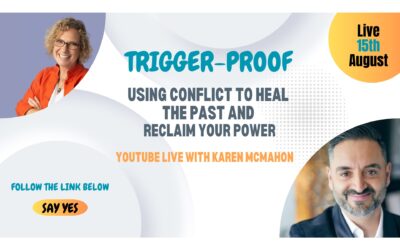I was reflecting on a conversation I just had
with someone who is really struggling in a 20 year relationship.
Her story was so common I wanted to see if you resonated
with it.
Have you ever noticed a difference
in how you feel when you're alone versus when you're with others?
For some people, there's a striking contrast:
Alone, they feel centered, clear, and connected to their desires.
With others—perhaps their partner, children, or colleagues—
something shifts.
They might find themselves adapting to others' moods,
prioritizing others' needs, or losing touch with their own perspective.
It can feel as if the boundaries
between self and others become blurred.
If this sounds familiar,
you might be experiencing a term called "enmeshment patterns."
And for many high-achieving individuals,
this might be an invisible factor affecting their relationships and well-being.
On this intuitive blind spot session –
a successful professional and devoted mother –
(Denise) described her experience this way:
"When I'm alone, I know exactly what I want and who I am.
But at home, with my family,
I get frustrated, angry, exhausted...
and I don't know why.
I love them more than anything,
but sometimes I feel like I'm disappearing."
She'd spent years in a relationship
where keeping the peace had become her priority.
Over time, she'd developed a pattern of adapting to others
while her own needs often remained unexpressed.
Some people might recognize this pattern in their own lives:
- Being highly attuned to others' emotions
while finding it difficult to identify their own - Excelling at caring for others
but struggling to articulate personal needs - Feeling responsible for others' feelings
while dismissing their own as unimportant - Experiencing a stronger sense of self
when alone versus in relationships
These patterns often develop for good reasons.
In many cases, they begin as intelligent adaptations to early environments.
As children, survival depends entirely on caregivers.
In environments where needs were inconsistently met –
or where managing adults' emotions became necessary for safety –
a child will learn to orient their attention externally.
They might become skilled at reading the room,
anticipating others' needs, and adapting to maintain connection.
These adaptations can be brilliant safety strategies.
They help children belong and survive.
They even help create a successful work environment.
But later in life, these same patterns will create challenges,
particularly in the area of authenticity and self-connection.
For some high-achieving individuals,
a painful paradox emerges:
The more successful they become at responding to external demands,
the more disconnected they may feel from their authentic desires.
Denise described her experience:
"I've built this life that looks good from the outside.
But inside– Sometimes I feel nauseous.
Claustrophobic.
Like I'm living someone else's life."
"There are moments when I don't even know what I want anymore.
I've spent so long focused on what everyone else needs."
When someone lives with this disconnection,
it can affect multiple areas of life:
- Physical well-being may suffer
as the nervous system remains vigilant to others' needs - Creative expression may become limited
when access to authentic desires is restricted - Decision-making will become challenging
when distinguishing personal desires from others' expectations - Joy will diminish when presence in one's own experience becomes difficult
And most significantly:
the capacity for genuine connection becomes compromised.
Because meaningful relationships –
the kind that nourish both people –
often require two distinct individuals coming together,
rather than one person adapting to the other.
As Denise reflected:
"I always thought loving meant putting myself last.
But I'm starting to see that might not be love at all.
That might just be... disappearing."
This pattern appears frequently among high achievers,
who often excel at meeting external expectations.
Many build success by being responsive to market demands,
client needs, or organizational goals.
No wonder she felt like she constantly wanted to escape life.
Who’s life is it, really?
When I asked my client what might happen
if she continued in this pattern for several more years,
her response was thoughtful:
"I'm concerned about my health.
I've already experienced panic attacks and anxiety.
My mother followed a similar pattern –
putting her needs last – and she developed serious health issues.
I wonder about that connection."
Her intuition aligns with research suggesting
that chronic disconnection from one's authentic needs
can create physiological stress that may manifest as:
- Sleep disturbances
- Digestive challenges
- Heightened anxiety
- Immune system changes
- Various stress-related conditions
The body often recognizes misalignment
with one's truth, even when the mind has rationalized it away.
If you identify with these patterns, here’s an invitation:
First, recognizing that these adaptations aren't character flaws.
They're often sophisticated survival strategies
that served an important purpose at one time.
So no need to shame yourself, even if you’re educated.
“I should know this already and shouldn’t have abandoned myself”
is BS.
You developed into this.
You couldn’t have known any better at the time.
Second, become aware of three common blind spots
that can perpetuate these patterns:
- The Boundary Misconception
Many people think of boundaries as walls that keep others out.
In reality, healthy boundaries might be more about
maintaining a clear sense of self in relationship with others.
Denise had tried external boundaries –
saying "no" more often, asking for help –
but still felt drained because the internal boundary
that protects one's sense of self was less developed.
- The Self-Worth Identity
Sometimes a person might intellectually know
they deserve to have their needs met,
while emotionally carrying a deeper belief
that their needs are secondary or unimportant.
This is a part of the shadow we can’t see,
but feel deeply– especially in stressful moments.
This can create a disconnect
between what someone consciously believes
and what they emotionally permit themselves to receive.
- The Capacity for Disapproval
Even when someone attempts to honor their authentic needs,
their nervous system might not have developed the capacity
to tolerate others' discomfort or disapproval.
This isn't about willpower.
It relates to the nervous system's window of tolerance
for interpersonal tension and frustration.
Addressing these areas often requires
more than just cognitive understanding.
You can be a therapist and still have no clue how to overcome it.
It can’t be learned in a book.
It involves approaches that work
with both mind and body.
This is why so many people find that traditional talk therapy
alone doesn't fully resolve these patterns.
As Denise expressed:
"We tried therapy. It wasn't helpful.
What's the use in talking things through for one hour a week
when for the remaining time I'm still in that reactive state?"
To resolve this we are summoned to go deeper.
An approach that:
- Addresses the nervous system patterns
that maintain these dynamics - Helps identify and honor authentic needs and desires
- Builds capacity to maintain self-connection
during interactions with others - Transforms identity patterns formed early in life
When people begin healing these patterns,
and becoming Trigger-Proof, remarkable shifts occur.
The changes aren't limited to relationships –
they can influence multiple aspects of life:
- Decision-making becomes clearer when it stems from authentic desires
- Social interactions can feel energizing rather than depleting
- Relationships may develop greater depth when based on authenticity
- Creativity and purpose often flourish when inner barriers dissolve
- External success can become aligned with internal fulfillment
Jenny– a client who felt she was disappearing–
shared her experience six months after our work together:
"For the first time in years,
I know who I am when I'm with others.
I can be with my family – fully present, fully loving –
without losing my sense of self.
I can identify my own boundaries and needs...
and honor them without the overwhelming guilt."
"The panic attacks have finally stopped. I'm sleeping better.
And most surprisingly–
My relationships feel more authentic than before.
It turns out genuine connections happen
when I'm being real rather than just accommodating."
This transformation isn't about becoming selfish
or disregarding relationships.
It's about developing wholeness
that allows for authentic presence in all areas of life.
It's about creating success that nourishes rather than depletes.
It's about building relationships where
connection doesn't require self-abandonment.
And it often begins with reclaiming the relationship
that forms the foundation for all others:
the one with oneself.
If you see yourself in Denise– just know,
you got this.
Your wingman on the adventure,
Nima
(I stand for healed families)
P.S. If this message resonated with your experience,
and you're ready to uncover your blind spots
of self-disconnection in relationships,
I may be able to help.
I'm offering a limited number of Intuitive Blind Spot Sessions
(valued at $497) for high-achieving individuals
who would like to develop stronger self-connection
while maintaining meaningful relationships.
In a focused 30-minute conversation, we:
- Explore where your unique relationship patterns might have originated
- Consider how these dynamics might be affecting your well-being today
- Uncover what you didn’t realize was stopping you
- Begin the process of establishing internal boundaries
- Create a roadmap for maintaining your authentic self in relationships
To be considered, comment or DM with:
- A brief description of your relationship patterns
- Approaches you've tried previously –
what worked and what didn’t - What you hope might change through this work
End your response with:
"Nima, can I please get a link to your private calendar?"
This conversation could help illuminate invisible patterns
and open new possibilities for your relationships and well-being.




